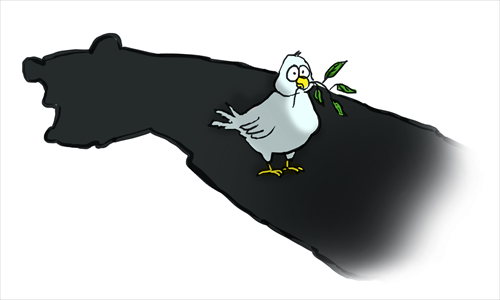Don't let Crimea crisis derail Iran talks

Illustration: Liu Rui/GT
As nuclear talks between Iran and the P5+1 (the five permanent members of the UN Security Council plus Germany) took place again in Vienna this month, the Russian negotiation team publicly dampened the optimism conveyed by the other delegations.
Russian Deputy Foreign Minister Sergei Ryabkov said in advance of the talks that he did not expect many substantial developments.
But the impression that Moscow was flirting with the idea of using the Iran nuclear talks as a vehicle for obstructionism was nurtured when on March 19, Ryabkov reacted to Western pressure on Russia over Moscow's Crimea policy, stating that Russia could retaliate by reconsidering its position on the Iranian nuclear dossier.
The talks that took place these months must start to produce follow-up steps to the Joint Plan of Action that expires on July 20, or resistance to diplomacy will grow.
Ryabkov didn't hint at a Crimea-Iran connection until after the talks in Vienna had ended, indicating that his statement was intended in an audience-specific (and not substantive) context.
Moscow's rhetorical linkage of the Iran diplomacy with Russia's policy in the Ukraine crisis, however, was just the most recent example of how these talks for a final nuclear status of Iran are proceeding in a context where political rhetoric can undermine the spirit of the Joint Plan of Action of November 24, 2013.
The much-discussed Congressional sanctions bill was perhaps the most notorious example of such a blatant disregard for the Joint Plan of Action by hardliner camps in Washington threatening to derail the diplomatic track. But also on a US federal governmental level, the Department of the Treasury has toughened the unilateral sanctions regime on Iran by listing a number of additional third country individuals and entities in early February.
Such policy signals are worrying indications of a US violation of its agreement to halt further sanctions for the duration of the six-month interim period. Meanwhile, Iranian Supreme Leader Ayatollah Ali Khamenei reminded the Iranian public of the basic US hostility toward "the Islamic Revolution and Islam" and conveyed his skepticism about the nuclear talks and of a possible US-Iran rapprochement, most recently on the occasion of his Nowruz (the Iranian New Year) speech in Mashad.
On the one hand, slipping back into discursive patterns of enmity can become a hedging strategy to allow for more conceptual creativity to hammer out future negotiation positions. US President Barack Obama's and Vice President Joe Biden's reiteration that the sanctions regime imposed on Iran firmly remains in place is a perfect case in point. On the other hand, however, this risks eroding an already fragile mutual trust in the other side's good faith.
With the danger that maximalist negotiation positions may threaten compromise in the nuclear talks, it is of the utmost importance that political leaderships make use of the momentum created by the Geneva deal. Failure to do so would shut the window of opportunity for a final status solution for the foreseeable future and end the mandate given to Rouhani's government to negotiate with the West.
Domestic criticism of the Iranian government's nuclear diplomacy is rising. In a letter to the Iranian negotiation team in mid-March, 200 Majlis deputies even demanded that no restrictions could be placed on the Arak reactor as the outcome of negotiations. The heavy-water reactor has been one of the sticky issues at the nuclear talks, with Western governments questioning its purpose, while Ali Akbar Salehi, head of the Iranian Atomic Energy Organization, called Western suspicions about the Arak facility a "fabricated fire."
Whatever Russia stands to lose economically in the eventuality of mid-term normalized relations between Iran and the West, the Kremlin also realizes that the alternatives are worse. Taking the Iran nuclear talks hostage by alluding to their derailment as a threat scenario in the Crimea conflict is not in Russia's self-interest.
Ending up with no follow-up deal by the end of this year would significantly increase the chance that confrontational rhetoric will return with a vengeance.
The author is a doctoral researcher at the University of Kent (Brussels) and currently a visiting doctoral fellow at China Foreign Affairs University. opinion@globaltimes.com.cn